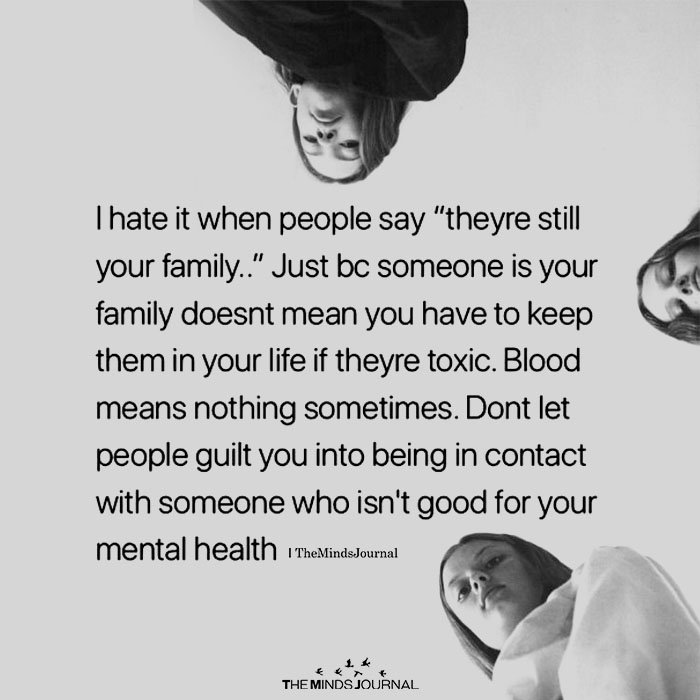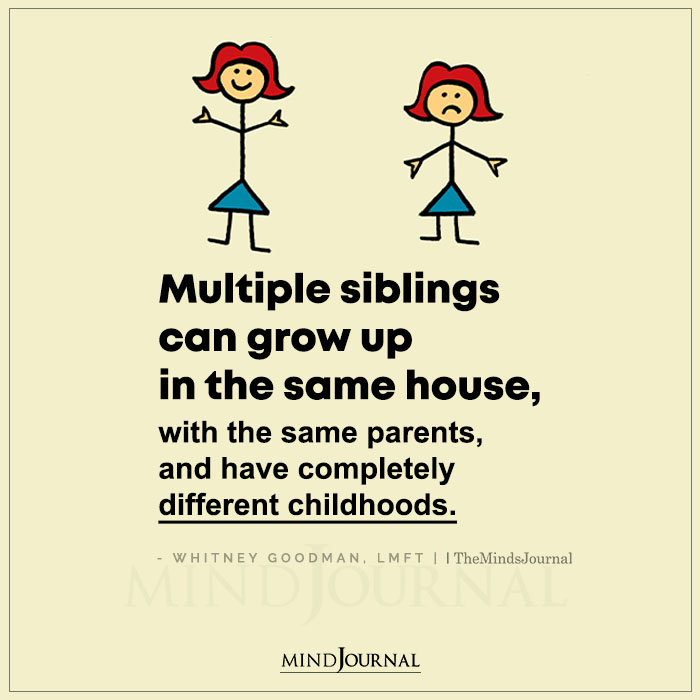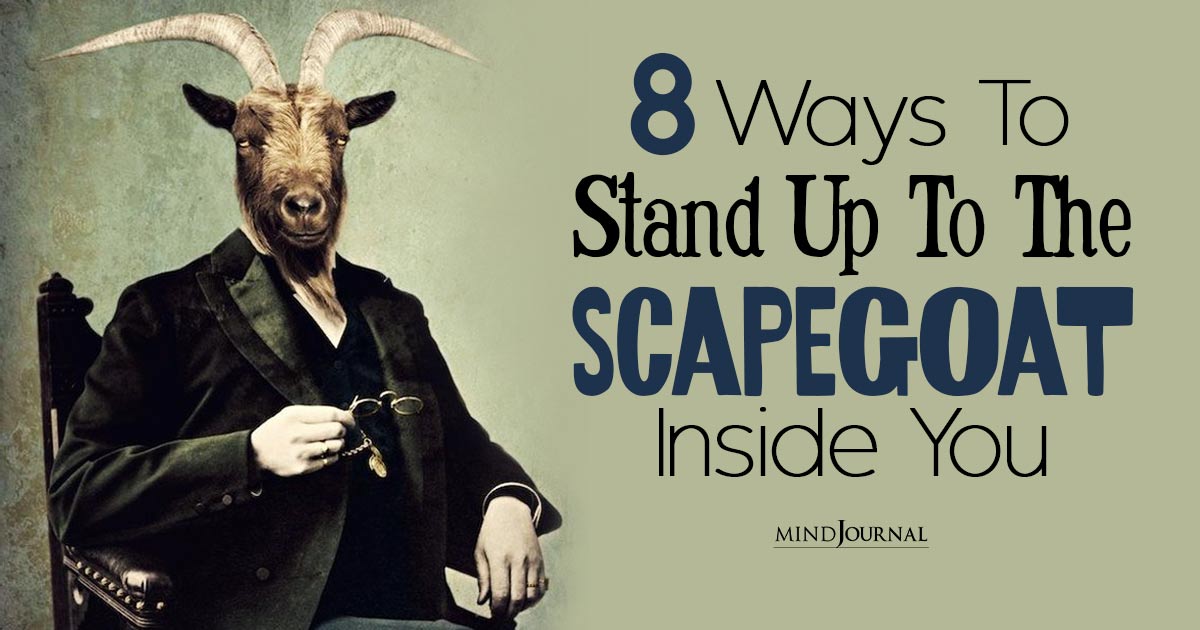Dealing with and healing the scapegoat inside you can be a long journey. But once you understand how scapegoating works and what you should do to deal with it, it gradually becomes easier.
Families who scapegoat use blame and criticism to deflect family problems onto individual members. In this way, scapegoaters avoid taking responsibility for dealing with their problems in general, and maintain the illusion that they are a normal, healthy family.
For example, mother drinks, but daughter is accused of being ‘bad’ and therefore blamed for mother’s stress related drinking.
The truth is that scapegoats are usually not responsible for the family’s problems, and may be the mentally healthiest family members. Scapegoats may also be the ‘whistle blowers’, calling out the family’s dysfunction.
Unhealthy families respond by mounting or maintaining an offensive against the whistle blower. The impact on the target of scapegoating can be devastating, often reflected in chronic feelings of guilt and worthlessness, grief, problems with personal relationships and work, and self identity issues.
Related: 10 Ways To Stand Up To Your Inner Scapegoat
Many targets come to believe the myths that they were told – that somehow they are defective, and accountable for other people’s problems and happiness. This internalized scapegoating may be the most harmful aspect of scapegoating, as targets harbor secret fears that they are fundamentally flawed.
When scapegoating happens early in life, when self identity is being formed, children come to believe that they are bad, inadequate and unlovable. This may be seen as ‘self evident’, and becomes an unconscious belief system in the target.
Scapegoated children grow up into adults who lack a true sense of who they really are, or their value as human beings.
If you have been scapegoated by your family – i.e. criticized, blamed and shamed – chances are that you may be doing it to yourself as well. It’s important to understand how this negative conditioning has impacted your beliefs and identity, and to interrupt and reframe any internalized scapegoating messages that are interfering with your life.
Below are 8 mental habits and actions that can help you take back your life from scapegoating by your family and yourself.
8 Ways To Stand Up to the Scapegoat Inside You
1. Stop: Thinking – and acting – like you are not good enough.
Start: Challenging this myth.
You were likely convinced through emotional, verbal and/or physical abuse that you somehow don’t measure up. Over time, this lie may have taken over your sense of self identity and worth.
See the myth for what it is – abuse and distortion designed to control you by making you believe you can’t be at peace unless you can achieve the impossible goal of earning the favour of people who abuse you.
Not only will scapegoaters never allow you to be right, but it’s the abusive behavior – not you – that’s not good enough! Cultivate insight as to why it is/was wrong for your parent(s) or siblings to abuse you.
Pretend you are adequate, even if you have a hard time believing it. This ‘fake it til you make it’ strategy works over time as you re-train your brain to see yourself more favourably – and more accurately – through rehearsal.
2. Stop: People pleasing – putting other people ahead of yourself, and feeling stressed, guilty or pre-occupied if you don’t.
Start: Calling a moratorium on having your life revolve around other people’s wants, needs or demands.
If you pour all your life energy into trying to be accepted, feel valued or loved, you are being controlled by the family myth that you are responsible for the happiness – and unhappiness – of others, and as the ‘bad seed’, you are flawed, and must prove that you are worthy of love.
Furthermore, if you give yourself away, there will be little left for you, leading to resentment, burnout and poor health. Perhaps you feel burned out already. Work on overcoming any fear of rejection or fear of unlovability that is keeping you hooked catering to others who can never be pleased.
Understand that you shouldn’t have to obey others, submit to their demands or ‘agree’ that you are the problem, in order to be accepted as a family member.

3. Stop: Taking responsibility for other people’s emotions and behaviour, and feeling guilty for not being able to make other people happy, especially those who constantly belittle you.
Start: Believing that adults are responsible for their own happiness, choices and destiny.
See the behaviour of scapegoaters for what it is – a distorted sense of entitlement and a double standard.
It’s just plain wrong that someone who is belittling you or trampling on your rights should expect you to be dedicated to making them feel good, especially a parent, whose job it is to care and nurture their child.
Children of selfish and demanding parents are not guilty of anything. They have been abused and manipulated into believing that their sole purpose is to make their parent happy. In fact this is a destructive con job, and the guilt rests with the self absorbed or narcissistic parent.
Related: The Blameless Burden: Scapegoating In Dysfunctional Families
4. Stop: Allowing yourself to be taken advantage of, taken for granted or being a doormat.
Start: Take back your power by learning to say “No”.
You may be the hardest person to convince that this is your right. Stop siding with the scapegoater against yourself. Work on overcoming any fear of abandonment or fear of failure that is keeping you hooked.
You likely have never been able to meet the demands of the scapegoater before, especially when you were trying to do the right thing. As the family scapegoat, it is unlikely that you will ever be ‘allowed’ to be right.
Believe you are worthy of respect, civil treatment, affection and love – just like anybody else.
5. Stop: Avoiding standing up for yourself, in order to side step anxiety or fear of loss.
Start: Dealing with uncomfortable emotions that are keeping your trapped in the scapegoat role.
It’s likely that you have met with ‘blow back’ if you tried to stand up for yourself before, leading to anxiety or fear. This doesn’t mean that you are wrong. What it does mean is that the person pushing back is out of line.
Focus on making decisions for yourself, and paying attention to your convictions. Get clear about your values, character, what you like and are good at.
Trust your gut sense that tells you that hurtful actions are wrong, and those who oppose your attempts to value yourself are not on your side. Treat yourself with the respect that is blatantly absent from interactions with scapegoaters.
Many people continue to participate in abusive relationships due to threats from their scapegoaters to cut them out if they don’t submit to the ‘rules’. This can be particularly painful when you stand to lose contact with parents, your child or grandchildren.
But continuing to participate in abusive relationships sends the message that it’s OK to submit to emotional blackmail, thereby perpetuating the scapegoating.
You have probably been conditioned to be fearful of those who have targeted you. This is understandable. But as an adult you can never be hurt or controlled in the ways you were as a child, when you had neither the power, options, nor the maturity to know the difference.
Find ways to manage your anxiety, and stand up for yourself anyway. You will likely find that your anxiety will go down over time, the less you allow fear and manipulative people to control you.
6. Stop: Repressing your emotions.
Children of self absorbed, scapegoating parents are discouraged from expressing their emotions or needs, as it takes the spotlight off the needy parent.
Start: Becoming aware of, accepting and – where appropriate or safe – expressing your emotions as they arise.
Tuning into your emotions with a tolerant, understanding attitude will help prevent feeling overwhelmed, blowing up, or shutting down, and increase closeness in relationships.
You will also get to know yourself better, and understand that emotions are valuable messengers that tell you when things are good, not so good, require change or need to be stopped altogether.
Related: 12 Steps For Family Scapegoat Healing
7. Stop: Being controlled by sibling rivalry.
Siblings are often unwittingly manipulated by the scapegoating parent, in an attempt to get children to side with them, or to punish those who are critical of negative family dynamics.
Similarly, a self-centred parent may exploit competition between siblings to try and maintain control. Later on, adult children may continue to scapegoat their siblings, perpetuating the abuse cycle from one generation to the next.
Start: Making yourself unavailable for parent-sibling scapegoating.
Avoid unhealthy triangulating with your controlling parent through your siblings. Communicate directly with people, not through a third party who’s delivering the imagined complaint to you, such as a sister or brother complaining about how much you have hurt a parent, or vice versa.
Be assertive with siblings. Explain that you will no longer be taking abuse. Describe the abusive behavior you will not subject yourself to. If you believe you may be getting through to your sibling, even in a small way, this is good news, as it creates an opening for potentially building a healthier relationship.
If you sibling pushes back, becomes more verbally or emotionally abusive, step back. Explain again that you will not stay present for abusive treatment.
Express what you want to see happening instead, that will enable you to stay in contact with your sibling. E.G. “We will speak to each other in a calm, respectful tone of voice, without anger, criticism or name calling, etc…”
Although it may be challenging, you will learn a lot about the possibilities or limitations of a relationship with your sib through these kinds of direct, assertive exchanges.

8. Stop: Going it alone.
Targets are deliberately isolated in families through the abusive process of scapegoating. Abuse victims may learn to avoid others in an attempt to prevent or minimize getting hurt again, or due to shame.
It may be difficult for targets to trust getting close to others, because those they were supposed to be closest to – their family -have betrayed them. Many scapegoats also fall into a tendency to isolate because they have come to believe they are flawed and, therefore, unlovable.
Start: Learning to challenge negative, fear based thinking so you can identify and develop healthy relationships.
Take your time. You will not overcome fear or squelch negative beliefs about yourself overnight. Get to know people slowly. If they seem trustworthy and treat you right, that is a signal to move closer. Find your allies, if any, within your extended family.
Related: Why Family Scapegoats Become Lifelong Victims?
Seek professional help if you are stuck. Counselling can help you release the pain, make decisions that work for you, and find ways to cope with or solve the challenges scapegoating hurls in your path.
Written By Glynis Sherwood MEd Originally Appeared On Glynis Sherwood











Leave a Reply